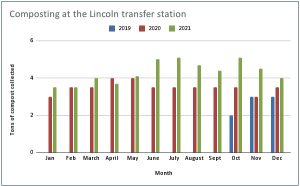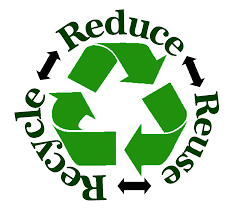By Alice Waugh
Previous articles in this series looked at what happens to Lincoln’s trash and single-stream recycling. The DPW recently published a guide that lists everything accepted at the transfer station and where residents should put things (see Section 6 in the regulations). But what then happens to all that stuff?
Also in this series:
- Part 5: The 5 R’s, and some numbers
- Part 4: Recycling beyond the transfer station
- Part 2: Trash
- Part 1: Single-stream recycling
Compost
DPW officials have been pleasantly surprised at the amount of compostables they’ve been collecting at the transfer station, saving tons of material from being incinerated along with the town’s trash.
Black Earth Compost began collecting compostables at the transfer station in October 2019. Since the program began with four barrels (two more were added in early 2021), residents have dropped off an average of 3.76 tons per month. The company turns what it collects into compost and sells back to the public, as well as to area farms (including Codman Community Farms and The Food Project) at a reduced rate.

(Source: Lincoln Department of Public Works)
What can you compost? Black Earth has a list here. It’s not just food scraps (including meat and dairy items) — it’s also napkins and paper towels, wine corks, coffee grounds and filters, toothpicks, popsicle sticks, compostable pizza boxes, and even pet waste and bedding from any animals except dogs and cats. Dishes, utensils, etc. that are specifically labeled as “home-compostable” are also accepted.
Residents may also sign up for curbside pickup of compostables for $15.99 a month (plus purchase of an animal-proof 13-gallon bin for $38 or a 4-gallon bin for $16). The starter kit includes compostable liners for a small countertop bin and the curbside bin. For those who have outdoor space for home composting, the DPW sells backyard containers at its Lewis Street headquarters for $25 and countertop containers for $10 (click here to order). Massachusetts residents may no longer throw away clothing and textiles with their trash starting on November 1. Fortunately, the transfer station has several receptacles for this stuff.
Textiles
Bay State Textiles, a for-profit company that has a bin at the transfer station and at the Lincoln School, collects clean and dry clothing and textiles in any condition including shoes, purses, linens and towels, bedding, etc. Every American throws out about 81 pounds of post-consumer textiles each year, but only about 15% of the total is reclaimed with the other 85% going into the municipal solid waste (trash), according to Paul Curry, the company’s president.
What happens to the stuff depends on what category it falls into: reusable, repurposable, or recyclable. Reusable clothing is sold to firms in developing countries that sell or give away the items to local residents. One of Bay State’s customers in the Dominican Republic employees several hundred people to sort and categorize the items by condition and quality as they’re prepared for sale, Curry said.
Repurposed items come from textiles that are torn up, made into wipes, and sold to factories and service industries all over the world, where they’re used for cleaning equipment, staining furniture, cleaning cars, etc. Some items are also targeted for fiber conversion — they’re shredded and recycled for use in carpet padding, insulation, furniture stuffing, among other things. Techniques and markets for turning cotton-rich and polyester-rich textiles into new fibers are also advancing. Only about 4-5% of the materials it collects can’t be used for anything, Curry said.
The nonprofit American Red Cross picks up clothing from one of the bins and sells it through a vendor, with a portion of the proceeds benefiting its Disaster Relief Fund. Donors are eligible for tax deductions.
Groups that accept new or gently used clothing and distribute items to people in need at little or no cost include:
- The St. Vincent DePaul Society
- Cradles to Crayons (newborn to age 12)
- Circle of Hope (Needham), which distributes items free of charge to 25 area shelters and low-income programs in Boston
- Solutions at Work Cambridge (clothing for children and homeless people a the Green Street Shelter, and business attire for job seekers)
- ThreadEd — a Newton charity that provides donated professional clothes to low-income college students
- thredUP — they mail you a free Donation Clean Out Kit with a pre-paid shipping label, and you get a tax receipt for $5 per bag.
More information:
- Textile recovery (MassDEP)
- FAQs about textile recycling (Secondary Materials and Recycled Textiles Association)
Books
The transfer station has a mini-swap shed for books and other media, as well as a bin where residents can drop books off for resale to benefit the Friends of the Lincoln Library (FOLL). Before the advent of Covid-19, the FOLL accepted donations in the Bemis Hall foyer and sold them at monthly book sales. Nowadays the materials are picked up by the Bay State Book Company, which sells them online and returns a portion of the proceeds to FOLL. There are also FOLL bins in the Donelan’s parking lot, Tracey’s Service Station (at the intersection of Bedford Road and Route 2, and Lincoln Gas and Auto Service at 170 South Great Rd.
The book shed is a place where residents can leave and also take home used books, puzzles and similar items. Volunteers take items that have hung around too long to More Than Words, a Waltham program that trains and employs at-risk youth in its $4 million book-selling business.
Mattresses and box springs
These may not be put in the regular trash after November 1, but there’s an area at the transfer staton to leave them, where they’re picked up by Raw Material Recovery. Massachusetts residents and businesses discard about 600,000 mattresses and box springs annually — but once disassembled, more than 75 percent of mattress components can be recycled, according to the Massachusetts DEP.
Electronics
Items you can leave in the electronics area include computers, monitors, printers, VCRs, stereo equipment, refrigerators, microwaves, etc. — “basically anything with a cord,” said Susan Donaldson, the DPW’s office manager. They are picked up by East Coast Electronics Recycling, which declined to comment on what it does with the materials it receives.
Batteries, fluorescent bulbs, deposit bottles
The old swap shed is the place to drop off these items.
Rechargeable lithium batteries and fluorescent lightbulbs (rod-shape and U-shaped) are processed by Veolia to remove harmful metals and chemicals. Ordinary alkaline batteries and button batteries no longer contain these substances and can be thrown into the regular trash. Incandescent lightbulbs are also fine to put in the trash. Car batteries should be taken to a service station for disposal.
Waverley Redemption Center in Waltham takes deposit bottles and pays the town a portion of the 5-cent deposit on each bottle, which goes into the DPW’s recycling budget.
Scrap metal
Schnitzer Steel in Everett picks up metals bin near the transfer station entrance. Items accepted in that bin include washers, dryers, metal pipes, fencing, cookware, baseball bats, outdoor grills, metal sinks, outdoor furniture, etc. (here’s a more detailed list of materials they buy from scrap dealers and contractors).
Schnitzer shreds the items into fist-sized pieces and sorts it with magnets to separate ferrous and nonferrous metals (steel vs. copper, aluminum, nickel, etc.), explained Eric Potashner, the company’s chief public affairs and communications officer. Most of the ferrous material from New England is shipped to steel mills overseas, where it’s smelted for making into new steel products such as rebar, sheet metal and car parts. The nonferrous metals are sent to another facility in Georgia for further processing to remove nonmetal components and then sold to domestic manufacturers to make into new products. Copper, a highly conductive metal, is much in demand these days since it’s a key component of electric vehicles.
(Editor’s note: this story was updated on August 8.)

I mix food waste with leaves and call it a compost pile. Even if I never use it the local insects are happy to have a new home.
I think buildings are going to use more copper than electric cars. Both wires and pipes use copper. There was a time when thieves would steal copper from houses under construction. A few thieves got zapped trying to steal wires from substations.
Thanks for publishing this very detailed and informative series. I have been wondering about “where does it all go?’ for a long time!